Publishing Talks: David Wilk Interviews Frank Rose
June 13, 2011 by David
Filed under Ebooks and Digital Publishing, PublishingTalks, The Future
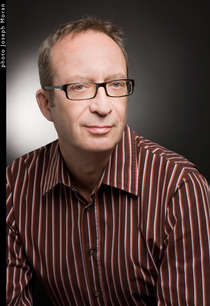 In this series of interviews, called Publishing Talks, I have been talking to book industry professionals and other smart people about the future of publishing, books, and culture. This is a period of disruption and change for all media businesses. We must wonder now, how will publishing evolve as our culture is affected by technology, climate change, population density, and the ebb and flow of civilization and economics?
In this series of interviews, called Publishing Talks, I have been talking to book industry professionals and other smart people about the future of publishing, books, and culture. This is a period of disruption and change for all media businesses. We must wonder now, how will publishing evolve as our culture is affected by technology, climate change, population density, and the ebb and flow of civilization and economics?
I hope these Publishing Talks conversations can help us understand the outlines of what is happening in the publishing industry, and how we might ourselves interact with and influence the future of publishing as it unfolds.
These interviews give people in and around the book business a chance to talk openly about ideas and concerns that are often only talked about “around the water cooler,” at industry conventions and events, and in emails between friends and they give people inside and outside the book industry a chance to hear first hand some of the most interesting and challenging thoughts, ideas and concepts being discussed by people in the book business.
Frank Rose is a journalist and author, most recently of a book called The Art of Immersion, How the Digital Generation Is Remaking Hollywood, Madison Avenue, and the Way We Tell Stories. I could easily have interviewed him about that book, which is interesting enough in its own right (and later this year I plan to talk to him about it for WritersCast).
But for this conversation, I wanted to talk to Frank about how writers are adapting to the changes wrought in publishing by the advent of digital books.
Frank has recently reprinted another one of his books, one that has been out of print for a number of years; it fits the profile of a fine book from the recent past that cannot be published or re-published commercially anymore. That book is called West of Eden: The End of Innocence at Apple Computer. It’s about the power struggle at Apple that ended up with Steve Jobs being pushed out of the company he had helped found. West of Eden was originally published in 1989 at which time it was a national best-seller and was rated as one of the ten best business books of the year by BusinessWeek.
In 2009, Frank published an updated version of the book himself for Amazon’s Kindle, as well as a digitally printed paperback edition under his own press name (Stuyvesant Street Press) and the book has been doing quite decently. One assumes that there are a fairly large number of people today who are interested in and knowledgeable about the history of modern computing and the computer industry. Enough for an author, if not for a commercial publisher to make a reasonable profit from publishing this book digitally.
Currently Frank writes for Wired, where he has been a contributing editor for almost ten years. Before this assignment, he was a contributing writer at Fortune, writing about Hollywood and global media conglomerates, he’s also been at Esquire, Premiere and Travel + Leisure, and has written for the New York Times Magazine among many other magazines. And he began his writing career at the Village Voice covering the emerging punk scene in Lower Manhattan in the ’70s.
Chances are good that Frank Rose’s experience as an author turned publisher will be reflective of a myriad of similar authors in the next few years. And perhaps will indicate some interesting opportunities for other segments within the publishing ecosystem.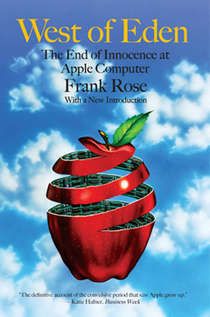 I think this conversation will be interesting to many in the book business who are thinking about how roles are changing in publishing, especially as digital publishing creates so many new opportunities for easy distribution to readers.
I think this conversation will be interesting to many in the book business who are thinking about how roles are changing in publishing, especially as digital publishing creates so many new opportunities for easy distribution to readers.
More on Frank Rose here. More on West of Eden at Amazon.
Podcast: Play in new window | Download
Nina Sankovitch: Tolstoy and the Purple Chair
June 5, 2011 by David
Filed under Non-Fiction, WritersCast
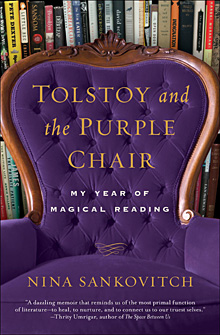 978-0061999840 – Harper – $23.99 – Hardcover (ebook version also available)
978-0061999840 – Harper – $23.99 – Hardcover (ebook version also available)
This is truly a wonderful book by an exceptional writer. Nina Sankovitch was living a full, active life as an environmental lawyer, happily married with four children, when her beloved sister became ill with cancer and died far too young. As she recounts in Tolstoy and the Purple Chair: My Year of Magical Reading, her initial response to her sister’s death was to “live her life double,” doing everything she could to try to make up for her terrible and painful loss. After three frantic years she realized what she was doing was unsustainable.
Ironically, her apparent retreat from doing to experiencing through reading was in some ways no less radical. Nina committed to reading a book a day for an entire year, no small commitment in itself, but further, she committed herself to writing a review or think piece about every book she read. That is a very high bar to set for any modern parent, even with a patient and understanding family (when I started Writerscast, I committed myself to read at least one book each week and to interview its author, a far lesser commitment, and after two years of doing it, I know how difficult, even impossible it would be for me to read a book a day, for a short period of time, much less a full year).
But Nina turned to reading because reading has always been central to her life and experience. Her immigrant parents read and loved books, as did Nina, from an early age. In Tolstoy and the Purple Chair, Nina tells the story of both her families, the vibrant one she grew up in, and the supportive and happy one she has raised. Many of the books she read in her magical year of reading are discussed here, as the stories of these books are part of the weave of how she transformed her experience of death into a celebration of life. And that is the crux of this memoir. By leaving her own experience to enter the realms of literally hundreds of writers, and making a place for those other stories in her own life, Nina was able to recreate and restore her own psyche – that’s the magic, the alchemy, of her magical year.
I should mention that Nina lives near me and has become a valued friend, partly through books we’ve read and discussed, including a couple I gave her to read and which are included in her year of reading. During that year she started an excellent blog called Read All Day where you can find all of her well written and exceptionally perceptive book reviews and essays.
Podcast: Play in new window | Download
Publishing Talks: David Wilk interviews Cevin Bryerman
May 29, 2011 by David
Filed under Ebooks and Digital Publishing, Publishing History, PublishingTalks, Technology, The Future
 In this series of interviews, called Publishing Talks, I have been talking to book industry professionals and other smart people about the future of publishing, books, and culture. This is a period of disruption and change for all media businesses. We must wonder now, how will publishing evolve as our culture is affected by technology, climate change, population density, and the ebb and flow of civilization and economics?
In this series of interviews, called Publishing Talks, I have been talking to book industry professionals and other smart people about the future of publishing, books, and culture. This is a period of disruption and change for all media businesses. We must wonder now, how will publishing evolve as our culture is affected by technology, climate change, population density, and the ebb and flow of civilization and economics?
I hope these Publishing Talks conversations can help us understand the outlines of what is happening in the publishing industry, and how we might ourselves interact with and influence the future of publishing as it unfolds.
These interviews give people in and around the book business a chance to talk openly about ideas and concerns that are often only talked about “around the water cooler,” at industry conventions and events, and in emails between friends and they give people inside and outside the book industry a chance to hear first hand some of the most interesting and challenging thoughts, ideas and concepts being discussed by people in the book business.
Cevin Bryerman is Publisher and Vice President of Publishers Weekly, the well-known international trade magazine for book publishing. Recently Cevin spoke at Montreal’s Atwater Library and Computer Centre about the changes revolutionizing the publishing world. His message there was reported to be “fatalistic, prescriptive, dismaying, and upbeat,” which probably reflects the way a large number of publishing people feel these days.
“The digital age is definitely here,” he told an auditorium packed with book industry professionals, “and you have to embrace it.” Indeed, the revolution has not left PW untouched, and the challenge that magazine has faced in transforming itself from a traditional subscription based print trade magazine into something very different is a continuing process.
I’m hopeful that our wide ranging and hopefully provocative conversation will spur further discussions and perhaps even raise some controversy about the current condition and future prospects for all the elements of the publishing ecosystem. Publishers Weekly online here. Very interesting (though brief) history of PW in Wikipedia here.
Publishers Weekly online here. Very interesting (though brief) history of PW in Wikipedia here.
Podcast: Play in new window | Download
Susie Bright: Big Sex Little Death (A Memoir)
May 21, 2011 by David
Filed under Non-Fiction, WritersCast
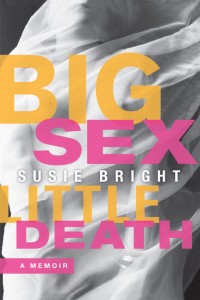 978-1580052641 – Seal Press – $24.95 – Hardcover (ebook and unabridged audio book available)
978-1580052641 – Seal Press – $24.95 – Hardcover (ebook and unabridged audio book available)
Reading Big Sex Little Death was a big surprise for me. I’ve known Susie Bright for a long time and have worked with her at various times over the years. I’ve long admired her work as a sex-positive revolutionist and a terrifically intrepid personality. I guess I was expecting a sexual travelogue as memoir and a pop culture tone of voice, and maybe some dishing on what it’s like to be a famous sexpert.
In fact Big Sex Little Death is mostly a really well written story that focuses more on Susie’s early years with her very difficult though intelligent mother (and later years when she was able to live with her anthropologist/linguist father), and her very active life as a political radical. In Southern California in the 70’s, Susie worked on a high school magazine called Red Tide, and later was an activist in the socialist movement of that period. Where, yes, there was a lot of sex (and sexism). Her radical political history was all new to me, and is very interesting to read about.
That was all before she became part of the pro-sex feminist movement in the 80’s, worked at the now famous Good Vibrations feminist sex shop, and helped found the now-famous lesbian sex magazine, On Our Backs, which for its seven year lifespan was hugely important in helping women define and own their sexuality. And in many ways that is what is most important about this memoir, that it connects politics and sexuality and helps us remember where so much of the culture we take for granted today came from.
Writing mostly about her earlier years, Susie leaves room, I suppose, for a sequel where she can talk about her later work as a nationally known sex expert, talented writer, and important editor of innumerable anthologies of writing about sex and sexuality.
As one might expect, we had a great time talking about her book and some of her many exploits as a public sex figure in a bizarrely prudish society. Ultimately this book should be read by anyone interested in late 20th century American culture, regardless of one’s gender, sexuality, interest in sex, out there or puritanical, it’s well worth your time. And I am a big fan of Susie’s blog too – and I recommend her latest on “sex positive parenting” to anyone who has ever thought about what they are teaching (or not) their children about their own values.![]()
Podcast: Play in new window | Download
Publishing Talks: David Wilk interviews Maxine Bleiweis
May 17, 2011 by David
Filed under Ebooks and Digital Publishing, PublishingTalks, Technology, The Future
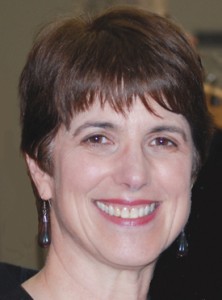 In this series of interviews, called Publishing Talks, I have been talking to book industry professionals and other smart people about the future of publishing, books, and culture. This is a period of disruption and change for all media businesses. We must wonder now, how will publishing evolve as our culture is affected by technology, climate change, population density, and the ebb and flow of civilization and economics?
In this series of interviews, called Publishing Talks, I have been talking to book industry professionals and other smart people about the future of publishing, books, and culture. This is a period of disruption and change for all media businesses. We must wonder now, how will publishing evolve as our culture is affected by technology, climate change, population density, and the ebb and flow of civilization and economics?
I hope these Publishing Talks conversations can help us understand the outlines of what is happening in the publishing industry, and how we might ourselves interact with and influence the future of publishing as it unfolds.
These interviews give people in and around the book business a chance to talk openly about ideas and concerns that are often only talked about “around the water cooler,” at industry conventions and events, and in emails between friends and they give people inside and outside the book industry a chance to hear first hand some of the most interesting and challenging thoughts, ideas and concepts being discussed by people in the book business.
Since so many of the people I’ve talked to in the Publishing Talks interviews have been in the areas of publishing and technology, I have wanted to broaden the conversation to include other perspectives. And following the conversation with Hugh McGuire about the future of libraries (a hot topic it seems, as a recent post by Seth Godin seems to indicate), it made sense to talk to a librarian who is working on the issues of access and technology from the user side of the publishing equation. I live near Westport, Connecticut, which has a fabulous library, with a myriad of public events, an incredibly active and engaged community, and a deep commitment to using technology to increase access to knowledge and information, as well as a wonderful and engaged staff.
Maxine Bleiweis is the Director of the Westport Public Library. She is a terrifically innovative manager, known for her ability to predict trends and determine ways to meet the latest “customer” needs as they emerge. Before she became director in Westport in 1998, she was director in Suffield, CT for six years and Newington, CT for 18 years.
I also noticed that she was recently named Outstanding Librarian for 2011 by the CT Library Association, so she is recognized by her peers as well as her own community.
Maxine has a great deal to say about publishing and technology, and her thoughts and ideas are well worth paying attention to. And even though the Westport Public Library does represent the beliefs and commitment of a very affluent, educated and progressive town, what this library does to enrich the intellectual and artistic life of its community is not enabled simply by having more resources than others. The principle at work here will work elsewhere – the idea of paying attention to what the community needs and doing everything possible to meet those needs is universally applicable. You can see what they are doing here.
Maxine and I had a wide ranging conversation about books, community, the future of publishing in the digital age, how libraries will handle ebooks and digital access, and how some of the controversies that have arisen in these important areas may be resolved. 
Podcast: Play in new window | Download
Peter Mountford: A Young Man’s Guide to Late Capitalism
May 10, 2011 by David
Filed under Fiction, WritersCast
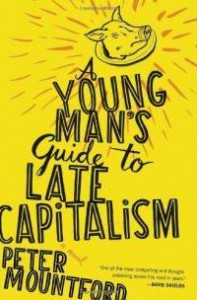 978-0-547-47335-2 – Houghton Mifflin Harcourt – paperback – $15.95 (ebook versions available)
978-0-547-47335-2 – Houghton Mifflin Harcourt – paperback – $15.95 (ebook versions available)
I read about this book a few months ago and knew from the title alone that I wanted to read this novel. How many political novels are there (readable ones anyway)? Well, it turns out that Peter Mountford is a terrific writer, and A Young Man’s Guide to Late Capitalism is a very special debut novel, completely captivating and very subtle, even as it takes on some of the characteristics of a French farce (with the requisite literal and figurative doors opening and closing throughout).
The book is about Gabriel, a young former reporter, not that long out of Brown, now operating as a covert hedge fund analyst in Bolivia, which is on the verge of electing a new populist president. Gabriel’s new job pays him incredibly well and puts him in the position of lying to absolutely everyone in his life, from his mother, a famous Chilean exile writer/professor (and a political radical), to all the journalists he cultivates, the older woman reporter he sleeps with, the young and beautiful press attache of the president to be (with whom he falls in love), to Evo (the presidential candidate himself) and everyone else in between.
One of the strengths of this novel is that there are so many well crafted characters in this novel who actually matter to the story – though I admit there were times while I was reading that I had trouble keeping them all straight. Another strength of the novel is Mountford’s portrait of Bolivia itself. He weaves it beautifully into Gabriel’s story, and gives the country a wonderful character and strength.
This story is of course all about power and money in modern high level capitalism, and what they do to the hearts and souls of the individuals caught in its web. But Mountford resists making it easy for his characters or for us. Choices are not simple, causes and effects are complex, and yes, morality is often the primary casualty. But we do end up feeling deeply for Gabriel and understanding his choices, even if we find them difficult to accept. In that way, Peter Mountford has created a truly sympathetic character in a real life story, it’s one we recognize, understand, and must wonder how much of ourselves we see in it.
I really enjoyed having the opportunity to discover and read this book and talk to Peter Mountford while he was in the midst of his book launch tour. He’s an energetic talker about his work, which made our conversation great fun. I think you will enjoy our talk, and hopefully the book as well. I’m looking forward to his next book too – this is a writer we will want to hear more from.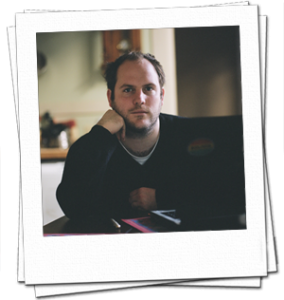 He’s a real find for anyone who likes to read new voices in modern fiction.
He’s a real find for anyone who likes to read new voices in modern fiction.
Podcast: Play in new window | Download
Publishing Talks: David Wilk interviews Hugh McGuire
May 1, 2011 by David
Filed under Ebooks and Digital Publishing, Publishing History, PublishingTalks, Technology, The Future
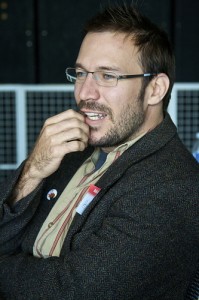 In this series of interviews, called Publishing Talks, I have been talking to book industry professionals and other smart people about the future of publishing, books, and culture. This is a period of disruption and change for all media businesses. We must wonder now, how will publishing evolve as our culture is affected by technology, climate change, population density, and the ebb and flow of civilization and economics?
In this series of interviews, called Publishing Talks, I have been talking to book industry professionals and other smart people about the future of publishing, books, and culture. This is a period of disruption and change for all media businesses. We must wonder now, how will publishing evolve as our culture is affected by technology, climate change, population density, and the ebb and flow of civilization and economics?
I hope these Publishing Talks conversations can help us understand the outlines of what is happening in the publishing industry, and how we might ourselves interact with and influence the future of publishing as it unfolds.
These interviews give people in and around the book business a chance to talk openly about ideas and concerns that are often only talked about “around the water cooler,” at industry conventions and events, and in emails between friends and they give people inside and outside the book industry a chance to hear first hand some of the most interesting and challenging thoughts, ideas and concepts being discussed by people in the book business.
Hugh McGuire is a serial digital entrepreneur. There’s a great story about him and an online interview at NextMontreal, in which the focus of the conversation is a company he started a few years ago called Book Oven, aiming to build an online book publishing platform. That particular venture did not meet expectations, but it’s a great story for anyone interested in digital publishing and start-up businesses in publishing (and resulted in a very cool tool called PressBooks, that “lets you and your team easily author and output books in multiple formats including: epub, Kindle, print-on-demand-ready PDF, HTML, and inDesign-ready XML.”)
Hugh is also the founder of the outstanding free audio book LibriVox, which currently features perhaps the largest catalog of audio books drawn from the public domain. It’s a great service and operates on open source principles. In addition to LibriVox, Hugh has also started and now runs a for-profit audio book business called Iambik, which shares many principles with LibriVox except in its profit goals, which of course drives a different business model.
What prompted me to contact Hugh now is the recent and terrific guest piece he wrote called What are Libraries For? for the outstanding blog In the Library with the Leadpipe (subtitled: The murder victim? Your library assumptions. Suspects? It could have been any of us.) This piece has so much great stuff in it (and is so well written and clear), that it’s a must-read for anyone interested in the future of publishing, books and readers (and In the Library is a great discovery too).
You may not agree with all of Hugh’s assumptions, nor his conclusions (I mostly do), but what he says will make you think hard about the digital future and what it will mean to libraries and every other institution in the book to reader supply chain. I’d be happy to hear from Writerscast listeners what you think of Hugh’s article after you read it. Comments are open.
Here’s the first graph of Hugh’s essay: “Ebooks will become the dominant form of casual reading for adults at some point in the future1. When this happens, community and public libraries will face a major existential crisis, because a fundamental (perhaps the fundamental) function of community libraries—lending print books—will no longer be a fundamental demand from the community. Libraries that do not adjust will find their services increasingly irrelevant to the populations they serve.”
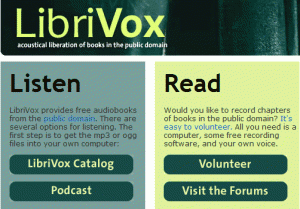
Podcast: Play in new window | Download
Brando Skyhorse: The Madonnas of Echo Park
April 24, 2011 by David
Filed under Fiction, WritersCast
 978-1439170847 – Free Press – Paperback – $14.00 (ebook versions also available)
978-1439170847 – Free Press – Paperback – $14.00 (ebook versions also available)
Brando Skyhorse’s spectacular debut is a novel created from a series of interlocking stories, all of which take place in the mostly Mexican Echo Park neighborhood of East Los Angeles. Like the rest of Southern California, Echo Park is in a constant state of flux, being invented and reinvented constantly as new populations arrive and are absorbed into the diverse culture of the city.
The opening line of the book sets the stage: “We slipped into this country like thieves, onto the land that once was ours.”
Each of the stories here focuses on the story of one character, and as the stories unfold, we realize that all of the characters we are meeting are entwined with each others lives, and particularly with the central tragedy that gives the book its name, the shooting of a three year old girl during a weekly afternoon Madonna dance party hosted by a group of local moms and their young daughters.
It took me some effort to keep track of all the characters and how they are related (it probably would have helped to have had a family tree), but all of them are so brilliantly written, I ended up caring about them enough not to worry too much about the details of their relationships. Every one of the characters in this novel experiences pain and loss and redemption. Each is in one way or another transcendent. Brando’s love for all of them, and for the community they live in and which lives in them, is palpable.
It’s no accident that this book has so much to say about identity, and how individuals make their own, both because of and in opposition to their surroundings. The author, Brando Skyhorse, grew up with five different stepfathers. He grew up most of his life believing he was Native American and only learned he was Mexican as an adult. Born and raised in Echo Park, Brando graduated from Stanford University and from the MFA Writers’ Workshop program at the University of California, Irvine. For ten years, and until recently, he worked as an editor in New York publishing.
In our conversation, we covered a wide number of issues, the background and basis for this novel, how it evolved over the years he wrote it, and much about the characters and locale of the book. We talked about identity, and what it means for fiction, for this author.
I really liked this book and recommend it highly to anyone who who likes modern fiction. And I am not alone – in March, 2011, Brando received the 2011 PEN/Hemingway Award for a distinguished first book of fiction. I’m looking forward to reading many more of his books.
 Visit the author’s website for more information, appearance schedule, etc.
Visit the author’s website for more information, appearance schedule, etc.
Podcast: Play in new window | Download
Summer Brenner: My Life in Clothes
April 16, 2011 by David
Filed under Fiction, WritersCast
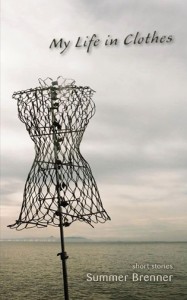 978-1597091633 – Paperback – Red Hen Press – $18.95 (ebook versions also available)
978-1597091633 – Paperback – Red Hen Press – $18.95 (ebook versions also available)
Summer Brenner is an economical and elegant writer whose fiction I have become very attached to (I read her noir novel, I-5, which I think is a terrific book, and interviewed her for Writerscast in December, 2009. Her latest book, published by the very fine Southern California based independent literary press, Red Hen, is a collection of stories called My Life in Clothes. It may as well be considered a novel, as the stories are interlocked and related enough to make one, marked by Ms. Brenner’s characteristically beautiful writing throughout.
That she was a poet first is evident in the carefulness and precision of her language; she writes a gorgeous and transparent prose that is warm and fluid and easy to inhabit. The Economist gave My Life in Clothes a terrific review, and called this book “a fierce and funny slip of a thing,” and while I love the allusion to clothes in that comment, I think this book is much more than a “slip.” Brenner loves her characters and tells their stories effortlessly. It’s the retelling and and reimagining of her own life after all. Clothes are the reference point throughout.
The story begins with Moshe Auerbach, a Lithuanian refugee who comes to America, then follows his family line to Atlanta and then the protagonist and her friends and lovers in California from the sixties onward. Along the way we meet Marguerite, the protagonist’s mother, whose fixation on clothing and appearances is a key element of the book and her cousin Peggy, whose own interest in clothes and what they mean for self image is profoundly meaningful for her in every respect.
Brenner’s writing shines. She’s funny, poignant and sharp. Here’s just one of the many great turns of phrase she manages in this book: “Peter and I used to sit for hours with rod and bait, our legs dangling over the pier, sipping beer, waiting for something to happen,” she begins one story. “Most of the time, nothing did. But that didn’t matter. We were looking for an excuse to do nothing and preferred if it had a name. Fishing is the best apology ever invented.” There are many more – I highly recommend this book to anyone who appreciates wonderful writing, and stories well told.
Brenner is a prolific and diverse writer. She has published a dozen books of poetry, fiction, and novels for children. Another recent title is Richmond Tales, Lost Secrets of the Iron Triangle, a novel for youth, which received a 2010 Richmond Historic Preservation award. Gallimard’s “la serie noire” published another of Brenner’s crime novels, Presque nulle part which PM Press will release by its English title, Nearly Nowhere, in 2012.
Her voice is wonderful to listen to as well, and I think you will enjoy our conversation about My Life in Clothes, and its wonderful stories and characters.
Podcast: Play in new window | Download
Publishing Talks: David Wilk interviews Matt Bell
April 10, 2011 by David
Filed under Ebooks and Digital Publishing, PublishingTalks, The Future
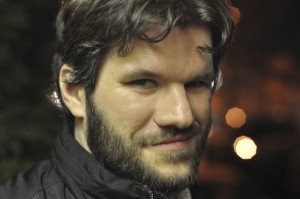 In this series of interviews, called Publishing Talks, I have been talking to book industry professionals and other smart people about the future of publishing, books, and culture. This is a period of disruption and change for all media businesses. We must wonder now, how will publishing evolve as our culture is affected by technology, climate change, population density, and the ebb and flow of civilization and economics?
In this series of interviews, called Publishing Talks, I have been talking to book industry professionals and other smart people about the future of publishing, books, and culture. This is a period of disruption and change for all media businesses. We must wonder now, how will publishing evolve as our culture is affected by technology, climate change, population density, and the ebb and flow of civilization and economics?
I hope these Publishing Talks conversations can help us understand the outlines of what is happening in the publishing industry, and how we might ourselves interact with and influence the future of publishing as it unfolds.
These interviews give people in and around the book business a chance to talk openly about ideas and concerns that are often only talked about “around the water cooler,” at industry conventions and events, and in emails between friends and they give people inside and outside the book industry a chance to hear first hand some of the most interesting and challenging thoughts, ideas and concepts being discussed by people in the book business.
Dzanc Books is an amazing collaboration of a number of relatively young writers, editors and literary activists. Founded only a few years ago (2006), it has now brought under its very broad umbrella, a large number of really interesting literary groups and activities, taking advantage of its nonprofit status to raise money for its work. Here’s a brief description of all the projects they are involved with now (taken from the Dzanc website):
• Publishes innovative and award-winning literary fiction, including short story collections and novels.
• Supports several editorially-independent imprints and literary journals, including Black Lawrence Press, OV Books, Keyhole Press, Starcherone, Monkeybicycle, and Absinthe: New European Writing
• Publishes The Collagist, a monthly online literary journal launched in August 2009
• Recognizes the best stories, poems, and non-fiction published online each year through the Best of the Web anthology series, now in its third year
• Provides low-cost writing instruction to beginning and emerging writers by connecting them with accomplished writers through the innovative Dzanc Creative Writing Sessions
• Funds the Dzanc Writers-in-Residence Program, which places published authors in public schools to teach creative writing to elementary and secondary students
• Conducts the yearly Dzanc Prize, which recognizes a single writer for both literary excellence and community service, as well as an annual short story collection competition
• Offers the Disquiet International Literary Program, a writing conference held in Lisbon, Portugal
• Creates internship opportunities for students looking to gain valuable experience in independent publishing
Dzanc has been on my radar for a while, and I subscribed to their really interesting e-book club, which is not only a cool idea for an independent press to undertake, but is also a great way for readers to easily find some new writers to read and enjoy. This particular project represents some great new thinking about ways that digital technology can create new opportunities for publishers to interact with readers. But Dzanc’s nonprofit model, and ability to foster new projects across a broad range of literary activities, and to almost amoeba-like, absorb new energy and ideas into its structure is a powerful organizational model that may offer hopeful lessons for literary writing across the country. Another corollary may be McSweeney’s, which has a similar umbrella approach to innovative and energetic literary projects.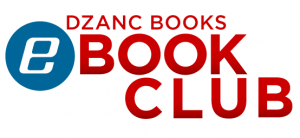
I talked to Matt Bell, who is not only Editor for Dzanc Books, The Collagist and of Dzanc’s Best of the Web anthology series, but is himself a very interesting writer, author of How They Were Found, and three chapbooks and a number of magazines and anthologies. His book reviews and critical essays have appeared in The Los Angeles Times, American Book Review, and The Quarterly Conversation. We discussed the plethora of Dzanc activities, their overall business model, and in particular their digital publishing program, all of which I think is valuable for anyone thinking about how publishing and writing are evolving into a new and vibrant future. 
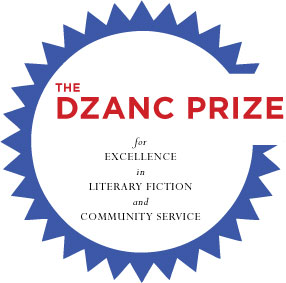
Podcast: Play in new window | Download


